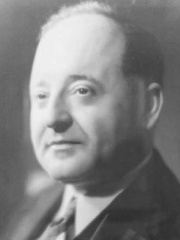
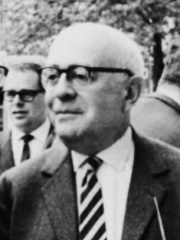
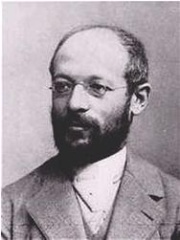



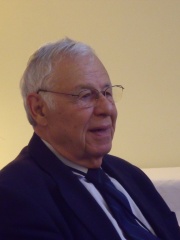

The Most Famous
SOCIOLOGISTS from Germany
This page contains a list of the greatest German Sociologists. The pantheon dataset contains 79 Sociologists, 11 of which were born in Germany. This makes Germany the birth place of the 2nd most number of Sociologists.
Top 10
The following people are considered by Pantheon to be the top 10 most legendary German Sociologists of all time. This list of famous German Sociologists is sorted by HPI (Historical Popularity Index), a metric that aggregates information on a biography's online popularity. Visit the rankings page to view the entire list of German Sociologists.

1. Max Weber (1864 - 1920)
With an HPI of 87.20, Max Weber is the most famous German Sociologist. His biography has been translated into 136 different languages on wikipedia.
Maximilian Carl Emil Weber (; German: [ˈveːbɐ] ; 21 April 1864 – 14 June 1920) was a German sociologist, historian, jurist, and political economist who was one of the central figures in the development of sociology and the social sciences more generally. His ideas continue to influence social theory and research. Born in Erfurt in 1864, Weber studied law and history in Berlin, Göttingen, and Heidelberg. After earning his doctorate in law in 1889 and habilitation in 1891, he taught in Berlin, Freiburg, and Heidelberg. He married his cousin Marianne Schnitger two years later. In 1897, he had a breakdown after his father died following an argument. Weber ceased teaching and travelled until the early 1900s. He recovered and wrote The Protestant Ethic and the Spirit of Capitalism. During the First World War, he initially supported Germany's war effort but became critical of it and supported democratisation. He also gave the lectures "Science as a Vocation" and "Politics as a Vocation". After the war, Weber co-founded the German Democratic Party, unsuccessfully ran for office, and advised the drafting of the Weimar Constitution. Becoming frustrated with politics, he resumed teaching in Vienna and Munich. He died of pneumonia in 1920 at the age of 56, possibly as a result of the post-war Spanish flu pandemic. A book, Economy and Society, was left unfinished. One of Weber's main intellectual concerns was in understanding the processes of rationalisation and disenchantment. He formulated a thesis arguing that such processes were associated with the rise of capitalism and modernity. Weber also argued that the Protestant work ethic influenced the creation of capitalism in The Protestant Ethic and the Spirit of Capitalism. It was followed by The Economic Ethics of the World Religions, where he examined the religions of China, India, and ancient Judaism. In terms of government, Weber argued that states were defined by their monopoly on violence and categorised social authority into three distinct forms: charismatic, traditional, and rational-legal. He was also a key proponent of methodological antipositivism, arguing for the study of social action through interpretive rather than purely empiricist methods. Weber made a variety of other contributions to economic sociology, political sociology, and the sociology of religion. After his death, the rise of Weberian scholarship was slowed by the Weimar Republic's political instability and the rise of Nazi Germany. In the post-war era, organised scholarship began to appear, led by Talcott Parsons. Other American and British scholars were also involved in its development. Over the course of the twentieth century, Weber's reputation grew as translations of his works became widely available and scholars increasingly engaged with his life and ideas. As a result of these works, he began to be regarded as a founding father of sociology, alongside Karl Marx and Émile Durkheim, and one of the central figures in the development of the social sciences more generally.

2. Theodor W. Adorno (1903 - 1969)
With an HPI of 78.37, Theodor W. Adorno is the 2nd most famous German Sociologist. His biography has been translated into 75 different languages.
Theodor W. Adorno ( ə-DOR-noh; German: [ˈteːodoːɐ̯ aˈdɔʁno] ; born Theodor Ludwig Wiesengrund; 11 September 1903 – 6 August 1969) was a German philosopher, musicologist, and social theorist. He was a leading member of the Frankfurt School of critical theory, whose work has come to be associated with thinkers such as Ernst Bloch, Walter Benjamin, Max Horkheimer, Erich Fromm, and Herbert Marcuse, for whom the works of Sigmund Freud, Karl Marx, and G. W. F. Hegel were essential to a critique of modern society. As a critic of both fascism and what he called the culture industry, his writings—such as Dialectic of Enlightenment (1947), Minima Moralia (1951), and Negative Dialectics (1966)—strongly influenced the European New Left. In an intellectual climate shaped by existentialism and logical positivism, Adorno developed a dialectical conception of history and philosophy that challenged the foundations of both, anticipating the divide that would later emerge between the analytic and continental traditions. As a classically trained musician, Adorno studied composition with Alban Berg of the Second Viennese School, influenced by his early admiration for the music of Arnold Schoenberg. Adorno's commitment to avant-garde music formed the backdrop of his subsequent writings and led to his collaboration with Thomas Mann on the latter's novel Doctor Faustus (1947), while the two men lived in California as exiles during the Second World War. Working at the newly relocated Institute for Social Research, Adorno collaborated on influential studies of authoritarianism, antisemitism, and propaganda that would later serve as models for sociological studies the institute carried out in post-war Germany. Upon his return to Frankfurt, Adorno was involved with the reconstitution of German intellectual life through debates with Karl Popper on the limitations of positivist science, critiques of Martin Heidegger's language of authenticity, writings on German responsibility for the Holocaust, and continued interventions into matters of public policy. As a writer of polemics in the tradition of Friedrich Nietzsche and Karl Kraus, Adorno delivered scathing critiques of contemporary Western culture. Adorno's posthumously published Aesthetic Theory (1970), which he had planned to dedicate to Samuel Beckett, is the culmination of a lifelong commitment to modern art, which attempts to revoke the "fatal separation" of feeling and understanding long demanded by the history of philosophy, and explode the privilege aesthetics accords to content over form and contemplation over immersion. Adorno was nominated for the 1965 Nobel Prize in Literature by Helmut Viebrock.

3. Georg Simmel (1858 - 1918)
With an HPI of 76.47, Georg Simmel is the 3rd most famous German Sociologist. His biography has been translated into 49 different languages.
Georg Simmel (; German: [ˈzɪml̩]; 1 March 1858 – 26 September 1918) was a German sociologist, philosopher, and critic. A founding figure of sociology, his neo-Kantian approach helped establish sociological antipositivism, asking "What is society?" in analogy to Kant's "What is nature?". He pioneered analyses of individuality and social fragmentation. Simmel discussed social and cultural phenomena in terms of "forms" and "contents" with a transient relationship, wherein form becomes content, and vice versa dependent on context. In this sense, Simmel was a forerunner to structuralist styles of reasoning in the social sciences. Through "The Metropolis and Mental Life" Simmel was a precursor of urban sociology, symbolic interactionism, and social network analysis. An acquaintance of Max Weber, Simmel wrote on the topic of personal character in a manner reminiscent of the sociological ideal type. He broadly rejected academic standards, however, philosophically covering topics such as emotion and romantic love. Both Simmel and Weber's nonpositivist theory informed the eclectic critical theory of the Frankfurt School.

4. Niklas Luhmann (1927 - 1998)
With an HPI of 70.91, Niklas Luhmann is the 4th most famous German Sociologist. His biography has been translated into 38 different languages.
Niklas Luhmann (; German: [ˈluːman]; December 8, 1927 – November 11, 1998) was a German sociologist, philosopher of social science, and systems theorist. Niklas Luhmann is one of the most influential German sociologists of the 20th century. His thinking was based on the philosophical tradition and at the same time the reception of a wide variety of concepts from modern science. From this foundation he developed a functionalist-oriented systems theory, which claims to be able to describe all social phenomena in a theoretically consistent language. Social systems are understood as communication contexts that have autonomy from the actors involved in them. On this basis, three types of social systems can be distinguished: interaction, organization and society. On his general theory he developed a social theory, which describes modern society as a global society that is characterized by an internal differentiation into various autonomously working functional areas such as politics, law, economics, science, religion and art. According to Luhmann, their operations can not be coordinated centrally.
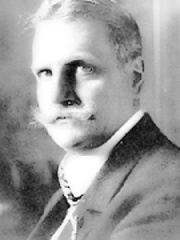
5. Robert Michels (1876 - 1936)
With an HPI of 66.84, Robert Michels is the 5th most famous German Sociologist. His biography has been translated into 30 different languages.
Robert Michels (German: [ˈmɪçəls]; 9 January 1876 – 3 May 1936) was a German-born Italian sociologist who contributed to elite theory by describing the political behavior of intellectual elites. He belonged to the Italian school of elitism. He is known best for his book Political Parties, published in 1911, which contains a description of the "iron law of oligarchy". Michels was a friend and disciple of Max Weber, Werner Sombart, and Achille Loria. Politically, he transitioned from the Social Democratic Party of Germany to the Italian Socialist Party, endorsing the Italian revolutionary syndicalist group and later Italian fascism. His ideas provided the basis of moderation theory, which specifies the processes by which radical political groups are incorporated into an existing political system.

6. Juan José Linz (1926 - 2013)
With an HPI of 64.60, Juan José Linz is the 6th most famous German Sociologist. His biography has been translated into 22 different languages.
Juan José Linz Storch de Gracia (24 December 1926 – 1 October 2013) was a German-born Spanish sociologist and political scientist specializing in comparative politics. From 1961 he was Sterling Professor Emeritus of Sociology and Political Science at Yale University and later also an honorary member of the Scientific Council at the Juan March Institute. He is best known for his work on authoritarian political regimes and democratization.

7. Andre Gunder Frank (1929 - 2005)
With an HPI of 62.96, Andre Gunder Frank is the 7th most famous German Sociologist. His biography has been translated into 26 different languages.
Andre Gunder Frank (February 24, 1929 – April 25, 2005) was a German-American sociologist and economic historian who promoted dependency theory after 1970 and world-systems theory after 1984. He employed some Marxian concepts on political economy, but rejected Marx's stages of history, and economic history generally.

8. Amitai Etzioni (1929 - 2023)
With an HPI of 61.33, Amitai Etzioni is the 8th most famous German Sociologist. His biography has been translated into 22 different languages.
Amitai Etzioni (; Hebrew: אמיתי עציוני; né Werner Falk; 4 January 1929 – 31 May 2023) was an Israeli-American sociologist, best known for his work on socioeconomics and communitarianism. He founded the Communitarian Network, a non-profit, non-partisan organization dedicated to supporting the moral, social, and political foundations of society. He established the network to disseminate the movement's ideas. His writings argue for a carefully crafted balance between individual rights and social responsibilities, and between autonomy and order, in social structure. In 2001, he was named among the top 100 American intellectuals, as measured by academic citations, in Richard Posner's book, Public Intellectuals: A Study of Decline. Etzioni was the Director of the Institute for Communitarian Policy Studies at The George Washington University, where he also served as a professor of International Affairs.

9. Lewis A. Coser (1913 - 2003)
With an HPI of 57.30, Lewis A. Coser is the 9th most famous German Sociologist. His biography has been translated into 15 different languages.
Lewis Alfred Coser (27 November 1913 in Berlin – 8 July 2003 in Cambridge, Massachusetts) was a German-American sociologist, serving as the 66th president of the American Sociological Association in 1975.

10. Claus Offe (1940 - 2025)
With an HPI of 56.23, Claus Offe is the 10th most famous German Sociologist. His biography has been translated into 16 different languages.
Claus Offe (16 March 1940 – 1 October 2025) was a German political sociologist associated with the Frankfurt School who taught at universities in Germany and the United States, with a focus on political economic analysis. He found new perspectives for a wide range of topics such as analysis of social crises, the welfare state, the transformation of Eastern Europe and European integration, unconditional basic income, civil society and the common good. Offe was a founding member of the Greens and of the Hertie School.
People
Pantheon has 11 people classified as German sociologists born between 1858 and 1940. Of these 11, none of them are still alive today. The most famous deceased German sociologists include Max Weber, Theodor W. Adorno, and Georg Simmel.
Deceased German Sociologists
Go to all RankingsMax Weber
1864 - 1920
HPI: 87.20
Theodor W. Adorno
1903 - 1969
HPI: 78.37
Georg Simmel
1858 - 1918
HPI: 76.47
Niklas Luhmann
1927 - 1998
HPI: 70.91
Robert Michels
1876 - 1936
HPI: 66.84
Juan José Linz
1926 - 2013
HPI: 64.60
Andre Gunder Frank
1929 - 2005
HPI: 62.96
Amitai Etzioni
1929 - 2023
HPI: 61.33
Lewis A. Coser
1913 - 2003
HPI: 57.30
Claus Offe
1940 - 2025
HPI: 56.23
Louis Wirth
1897 - 1952
HPI: 55.52
Overlapping Lives
Which Sociologists were alive at the same time? This visualization shows the lifespans of the 11 most globally memorable Sociologists since 1700.

